雾都孤儿 赏析
雾都孤儿好句好段及赏析
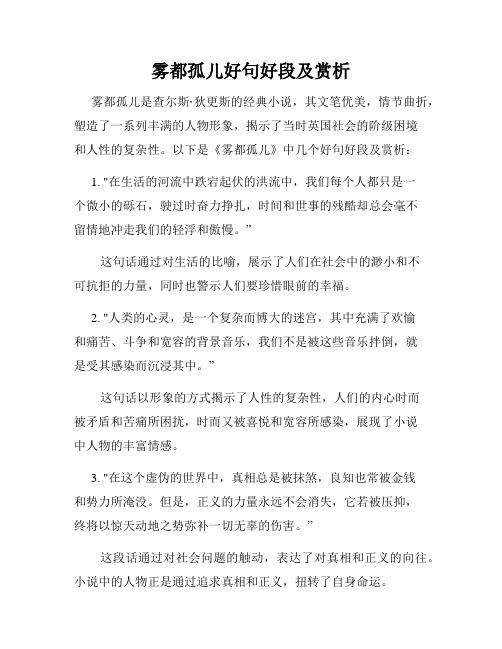
雾都孤儿好句好段及赏析雾都孤儿是查尔斯·狄更斯的经典小说,其文笔优美,情节曲折,塑造了一系列丰满的人物形象,揭示了当时英国社会的阶级困境和人性的复杂性。
以下是《雾都孤儿》中几个好句好段及赏析:1. "在生活的河流中跌宕起伏的洪流中,我们每个人都只是一个微小的砾石,驶过时奋力挣扎,时间和世事的残酷却总会毫不留情地冲走我们的轻浮和傲慢。
”这句话通过对生活的比喻,展示了人们在社会中的渺小和不可抗拒的力量,同时也警示人们要珍惜眼前的幸福。
2. "人类的心灵,是一个复杂而博大的迷宫,其中充满了欢愉和痛苦、斗争和宽容的背景音乐,我们不是被这些音乐拌倒,就是受其感染而沉浸其中。
”这句话以形象的方式揭示了人性的复杂性,人们的内心时而被矛盾和苦痛所困扰,时而又被喜悦和宽容所感染,展现了小说中人物的丰富情感。
3. "在这个虚伪的世界中,真相总是被抹煞,良知也常被金钱和势力所淹没。
但是,正义的力量永远不会消失,它若被压抑,终将以惊天动地之势弥补一切无辜的伤害。
”这段话通过对社会问题的触动,表达了对真相和正义的向往。
小说中的人物正是通过追求真相和正义,扭转了自身命运。
4. "寒冷的雾气弥漫在雾都的街头巷尾,包裹着一个个困苦的孤儿,他们躲避寒冷的同时也躲避着爱情和友情的温暖。
这座城市看似庞大无比,实则冷漠而无情,孤儿们只能依靠彼此的力量才能度过艰难的岁月。
”这段描述展现了小说中的雾都环境和孤儿们的困境。
雾气象征着冷漠和隔离,而孤儿们则依靠彼此的支持和友情共同面对困难。
5. "在这个阶级分明的社会里,穷人和富人之间的巨大差距让人难以忍受。
然而,在贫穷中,也有坚韧,有善良,有对美好生活的渴望。
这些贫苦的孩子们或许身处逆境,但他们的精神高扬着希望的旗帜。
”这段话揭示了小说中贫穷和富裕的对比,以及贫困环境中孩子们的坚韧和希望。
即使在逆境中,他们仍然保持着美好的向往。
通过以上几个好句好段,我们可以感受到《雾都孤儿》的魅力所在。
对雾都孤儿评价最好的语句

对雾都孤儿评价最好的语句引言《雾都孤儿》是英国作家查尔斯·狄更斯于19世纪80年代创作的一部小说,被公认为是狄更斯最伟大的作品之一。
它以细腻入微的描写、复杂的情节和鲜明的人物形象闻名于世。
本文旨在对《雾都孤儿》进行全面、详细、完整且深入地评价,揭示其卓越之处。
1. 精彩的人物刻画1.1 主要角色充满鲜活性和复杂性《雾都孤儿》中的主要角色都具备丰富的个性和深刻的内心世界。
例如,小孤儿奥利弗的单纯善良与坚韧不拔的精神深深打动了读者,他以自己的努力和善良摆脱了贫困和苦难。
同样令人难以忘怀的是以夏洛特·恩德尔为代表的一系列复杂而富有争议的女性角色,她们纷繁复杂的情感经历展现了社会对于女性的限制和压迫。
1.2 次要角色的鲜明个性和独特魅力除了主要角色外,小说中的次要角色也给人留下深刻的印象。
例如,老绅士布朗罗是一个聪明、机智而富有谋略的人物,他为众多救助机构的发展作出了巨大贡献;费根先生是一个险恶狡诈的小人物,他的形象展示了社会的黑暗面和道德堕落。
这些次要角色都是狄更斯对于社会各个层面人物形象刻画的杰作,使得整个故事更加丰富多彩。
2. 生动的描写和情感表达2.1 细腻入微的场景描写《雾都孤儿》中的场景描写极其细腻入微,读者仿佛置身于狄更斯笔下的伦敦雾都。
他巧妙地利用语言以及对细节的关注,将街巷、房屋、人物形象等刻画得栩栩如生。
例如,狄更斯写道:“他们穿过一个个狭窄黑暗的胡同,来到一个弯曲的诡异街道上。
湿漉漉的砖墙上滴下的水珠,在地面上悄然结成了冰块。
”这种描写方式使得读者更加深入地感受到故事背景的真实性和细节之美。
2.2 情感表达的深度和真实性狄更斯在《雾都孤儿》中通过对人物内心世界的描写以及情感表达的细腻而感人,向读者展示了生活的残酷与温暖。
他以第一人称和第三人称的叙事方式,将读者引入人物的内心世界,让读者能够深刻理解角色的情感和动机。
例如,当奥利弗遭受不公正待遇时,读者能够感受到他内心的愤怒和无助;当他在艰难中坚持善良时,读者也能够体会到他内心的喜悦和渴望。
苦难与希望的交织:《雾都孤儿》的主题分析
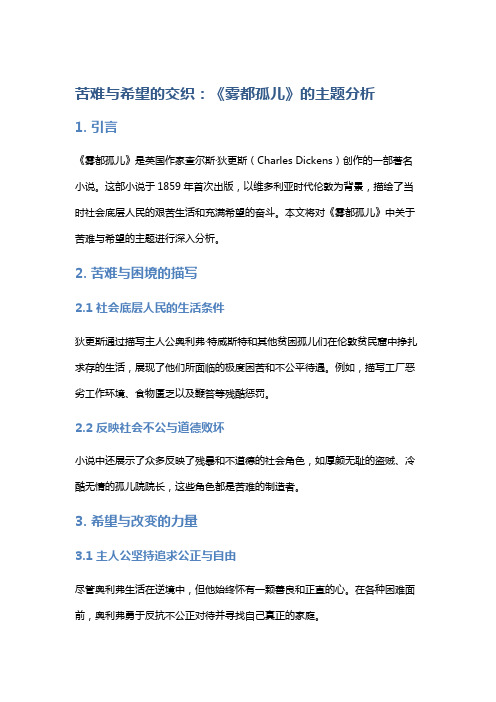
苦难与希望的交织:《雾都孤儿》的主题分析1. 引言《雾都孤儿》是英国作家查尔斯·狄更斯(Charles Dickens)创作的一部著名小说。
这部小说于1859年首次出版,以维多利亚时代伦敦为背景,描绘了当时社会底层人民的艰苦生活和充满希望的奋斗。
本文将对《雾都孤儿》中关于苦难与希望的主题进行深入分析。
2. 苦难与困境的描写2.1 社会底层人民的生活条件狄更斯通过描写主人公奥利弗·特威斯特和其他贫困孤儿们在伦敦贫民窟中挣扎求存的生活,展现了他们所面临的极度困苦和不公平待遇。
例如,描写工厂恶劣工作环境、食物匮乏以及鞭笞等残酷惩罚。
2.2 反映社会不公与道德败坏小说中还展示了众多反映了残暴和不道德的社会角色,如厚颜无耻的盗贼、冷酷无情的孤儿院院长,这些角色都是苦难的制造者。
3. 希望与改变的力量3.1 主人公坚持追求公正与自由尽管奥利弗生活在逆境中,但他始终怀有一颗善良和正直的心。
在各种困难面前,奥利弗勇于反抗不公正对待并寻找自己真正的家庭。
3.2 其他积极向上的角色小说中还描绘了许多积极向上、温暖善良的人物,例如平民夫妇布朗洛和罗丝等。
这些人物代表着希望与改变,并给予主人公温暖和支持。
4. 苦难与希望双重主题呈现4.1 相互作用与交织通过揭示社会底层人民所遭受的苦难,并配以一些令人拍案叫绝的情节发展和转折点,作者将苦难主题与希望主题相互交织在一起。
这种反差的安排使读者对主人公的遭遇产生更深刻的同情和共鸣。
4.2 呈现希望在黑暗中闪光狄更斯通过温暖善良的角色和主人公们艰难卓越的奋斗,呈现出希望在苦难中的闪光。
这些希望力量不仅是改变自身命运,也引发了社会进步和慈善行动。
5. 结论《雾都孤儿》展示了苦难与希望这两种情感之间微妙且强大的关系。
尽管小说中呈现了底层人民所面临的极度困苦和不公平待遇,但作者通过塑造积极向上、善良温暖的人物形象以及主人公们勇于追求公正与自由的精神,揭示了在困境中诞生希望并改变命运的力量。
雾都孤儿赏析

雾都孤儿赏析《雾都孤儿》赏析《雾都孤儿》是查尔斯·狄更斯创作的一部经典小说。
该小说通过描绘贫寒孤儿奥利弗的命运转变,以及对社会的道德批判,展现出了狄更斯对当时英国社会黑暗现实的深刻洞察力。
本文将从情节、人物塑造及主题等方面对《雾都孤儿》进行赏析。
小说以伦敦为背景,通过复杂而扣人心弦的故事情节吸引读者。
狄更斯以雾都伦敦的贫民窟为切入点,揭示了当时社会底层的悲惨生活状况。
奥利弗因为家庭背景贫寒,被送进了孤儿院。
在孤儿院中,他遭受了各种剥削和虐待。
随后,奥利弗被当做学徒送进了棺材制造厂。
在那里,他受到了恶劣的待遇,但他的善良和纯真的天性使他能够保持自己的尊严。
命运之神对他眷顾,在一连串的磨难后,他成功逃离了棺材制造厂,并在伦敦的大街上结识了一群与他命运相似的无家可归者,其中包括贫民窟金字塔的霸主——富勒梅先生。
在他们的帮助下,奥利弗逐渐找到了属于自己的家。
小说中的人物塑造生动鲜明,充满了独特的个性。
奥利弗是一个具有良好人品和道德勇气的人,他无论遭受多大的苦难,都能够保持一颗善良赤诚的心。
露西·琼斯是另一个重要角色,她是一位善良美丽的女孩,为奥利弗提供了帮助和支持。
相比之下,富勒梅先生则是一个不择手段的坏人,他在贫民窟中控制着一切,利用自己的权势和残忍对待其他人。
这些精心刻画的人物形象使故事更加生动有趣,读者可以更好地理解和认知他们的思想和行为。
《雾都孤儿》的主题突出了狄更斯对社会不公和人性的深刻观察。
通过对贫困和黑暗的呈现,狄更斯揭示了贫富悬殊和阶级固化的现实。
他批判了当时社会中的底层群体遭受的不公平待遇,呼吁社会关注贫困人群的生活和权益。
此外,狄更斯还赋予了故事积极向上的力量,通过奥利弗的成长和努力,表达了对人性的信仰和对美好未来的追求。
总之,《雾都孤儿》是一部透彻揭示当时社会黑暗的杰作。
通过精心构建的情节、生动鲜明的人物形象和深刻的主题思想,狄更斯成功地勾勒出了一个残酷而真实的社会画卷。
《雾都孤儿》的人性善恶对比分析
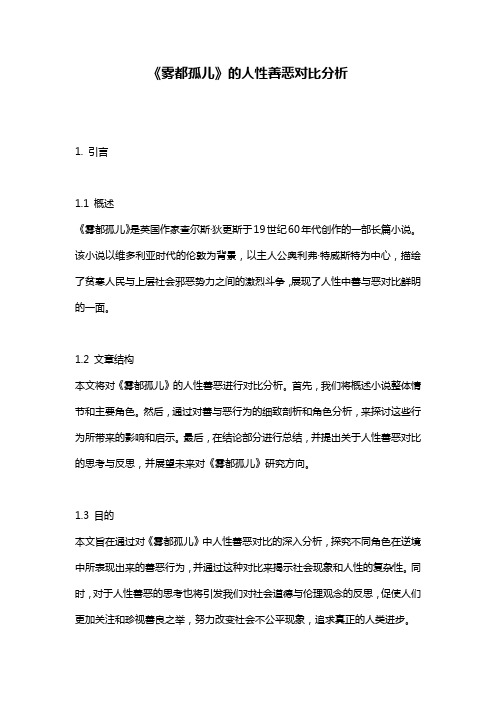
《雾都孤儿》的人性善恶对比分析1. 引言1.1 概述《雾都孤儿》是英国作家查尔斯·狄更斯于19世纪60年代创作的一部长篇小说。
该小说以维多利亚时代的伦敦为背景,以主人公奥利弗·特威斯特为中心,描绘了贫寒人民与上层社会邪恶势力之间的激烈斗争,展现了人性中善与恶对比鲜明的一面。
1.2 文章结构本文将对《雾都孤儿》的人性善恶进行对比分析。
首先,我们将概述小说整体情节和主要角色。
然后,通过对善与恶行为的细致剖析和角色分析,来探讨这些行为所带来的影响和启示。
最后,在结论部分进行总结,并提出关于人性善恶对比的思考与反思,并展望未来对《雾都孤儿》研究方向。
1.3 目的本文旨在通过对《雾都孤儿》中人性善恶对比的深入分析,探究不同角色在逆境中所表现出来的善恶行为,并通过这种对比来揭示社会现象和人性的复杂性。
同时,对于人性善恶的思考也将引发我们对社会道德与伦理观念的反思,促使人们更加关注和珍视善良之举,努力改变社会不公平现象,追求真正的人类进步。
2. 正文:2.1 雾都孤儿的人性善恶概述《雾都孤儿》是英国作家狄更斯笔下的一部经典小说,与其它作品一样,这部小说也深刻地探讨了人性中的善恶之间的对比。
故事发生在维多利亚时代的伦敦,描绘了社会底层贫困儿童的艰辛生活,并通过不同角色塑造呈现出善良和邪恶两种截然不同的人性。
2.2 善与恶的对比分析善与恶在《雾都孤儿》中通过不同角色和他们所表达的行为展现得淋漓尽致。
我们可以分类分析主要善行和正面人物角色以及主要恶行和负面人物角色,并探讨其中带给读者的影响和启示。
2.2.1 主要善行和正面人物角色分析在小说中存在着一些具有积极向上品质和善良内心的正面人物角色。
例如,奥利弗·特威斯特、布朗罗先生等。
奥利弗·特威斯特是一个纯真无邪的孤儿,在他痛苦的生活中展现出坚韧和善良。
他对恶势力保持着正直的态度,从不被负面环境所影响。
而布朗罗先生则是一位慈爱而正直的绅士,他致力于帮助奥利弗获得更好的生活,并在小说中发挥了积极的作用。
《雾都孤儿》:底层生活中的人性之光
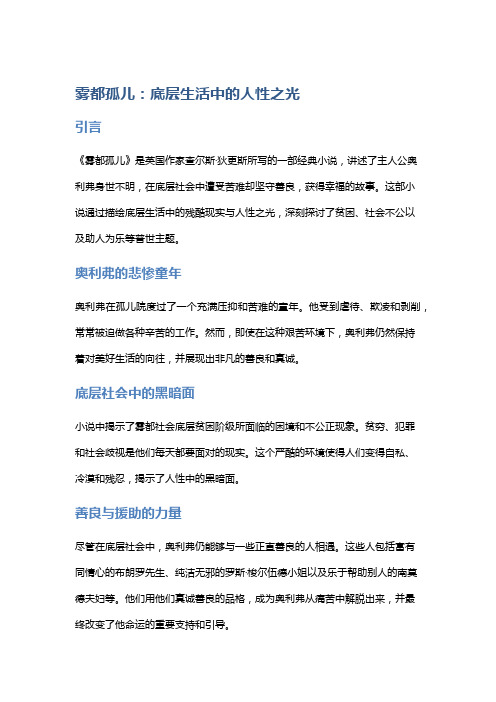
雾都孤儿:底层生活中的人性之光引言《雾都孤儿》是英国作家查尔斯·狄更斯所写的一部经典小说,讲述了主人公奥利弗身世不明,在底层社会中遭受苦难却坚守善良,获得幸福的故事。
这部小说通过描绘底层生活中的残酷现实与人性之光,深刻探讨了贫困、社会不公以及助人为乐等普世主题。
奥利弗的悲惨童年奥利弗在孤儿院度过了一个充满压抑和苦难的童年。
他受到虐待、欺凌和剥削,常常被迫做各种辛苦的工作。
然而,即使在这种艰苦环境下,奥利弗仍然保持着对美好生活的向往,并展现出非凡的善良和真诚。
底层社会中的黑暗面小说中揭示了雾都社会底层贫困阶级所面临的困境和不公正现象。
贫穷、犯罪和社会歧视是他们每天都要面对的现实。
这个严酷的环境使得人们变得自私、冷漠和残忍,揭示了人性中的黑暗面。
善良与援助的力量尽管在底层社会中,奥利弗仍能够与一些正直善良的人相遇。
这些人包括富有同情心的布朗罗先生、纯洁无邪的罗斯·梭尔伍德小姐以及乐于帮助别人的南莫德夫妇等。
他们用他们真诚善良的品格,成为奥利弗从痛苦中解脱出来,并最终改变了他命运的重要支持和引导。
宽容与正义对抗黑暗小说中呈现出奥利弗受到误解和指控,被迫进入犯罪世界等困境。
然而,在这一切黑暗面前,小说始终保持着对正义和宽容的坚定信念。
通过描写主角艰难却正直地走过磨难,最终获得幸福美满生活的结局,小说向读者传达了积极的价值观。
结论《雾都孤儿》这部小说通过生动的人物形象和精彩的叙事,展现了人性中善良与援助的力量。
尽管底层生活充满痛苦和黑暗,但正义、宽容和真诚善良的光芒仍然能够战胜一切困难,给予人们希望和改变。
这部小说不仅是文学作品,也是一面镜子,反映了社会中存在的不公和压迫,同时警示人们向善、拥抱希望,并为他人伸出援手。
以上是对《雾都孤儿》主题 "底层生活中的人性之光" 的概述。
这部小说以其深刻而感人的故事情节以及对社会底层现实的触动描述,让读者思考贫穷和不公如何影响一个人,同时也为我们展现了在逆境中绽放善良、勇气和希望的力量。
解读《雾都孤儿》

解读《雾都孤儿》《雾都孤儿》是英国作家狄更斯的一部经典小说,自出版以来,一直以其深刻的社会批判和对人性的剖析受到广泛关注。
本文将从以下几个方面对这部作品进行解读:1. 故事背景;2. 主要人物分析;3. 主题思想;4. 文学价值。
首先,我们来看一下《雾都孤儿》的故事背景。
故事发生在19世纪初的伦敦,这个时期正是英国工业革命的高潮期。
然而,随着工业化的推进,社会贫富差距不断加大,生活在底层的人民生活困苦。
雾都孤儿是指在这座城市中,许多失去父母的孩子在恶劣环境中艰难生存的现象。
奥利弗·特威斯特就是其中的一个典型代表。
他在很小的时候就失去了双亲,被送到了棺材店当学徒。
在这段艰难的生活中,他遇到了许多善良的人,也遭遇了许多不幸。
最终,在他成长的过程中,他逐渐摒弃了过去的恶习,成为一个有道德、有责任心的人。
接下来,我们来分析一下《雾都孤儿》中的主要人物。
奥利弗·特威斯特是这个故事的核心人物,他的成长过程充满了曲折。
他原本是一个善良、纯真的孩子,但在成长过程中,他逐渐受到了环境的影响,变得狡猾、自私。
然而,在他最困难的时候,他仍然保持着善良的本性,帮助了许多需要帮助的人。
此外,还有费金、罗斯佩尔等一众角色,他们在一定程度上反映了当时社会的各种现象。
再来看《雾都孤儿》的主题思想。
这部作品通过对奥利弗·特威斯特的成长经历的描绘,展现了当时英国社会的种种问题。
作者通过对底层人民生活的描写,揭示了社会的不公和对弱势群体的漠视。
同时,作品也表现了人性的复杂性,即使在最困难的时候,人们仍然可以保持善良和正义。
总的来说,《雾都孤儿》是一部具有深刻社会批判意义的作品。
最后,我们来探讨一下《雾都孤儿》的文学价值。
这部作品不仅具有很高的艺术价值,还具有很强的历史价值。
它为我们提供了一个了解19世纪英国社会的机会,使我们能够更好地理解那个时代的人们的生活和思想。
同时,作品中的许多情节和人物形象也成为了后世文学作品的灵感来源。
《雾都孤儿》赏析

《雾都孤儿》赏析《雾都孤儿》是英国作家狄更斯的一部长篇小说,首次发表于1854-1855年的《伦敦新锐杂志》上。
这部小说以其深刻的社会洞察力和生动的人物形象而闻名于世。
本文将从小说的主题、故事情节以及人物塑造等方面进行赏析。
一、社会洞察力《雾都孤儿》以19世纪伦敦为背景,描绘了那个时代工业革命带来的社会变革和剧烈的阶级矛盾。
小说中反映了贫富差距扩大的现象,揭露了工人阶级的悲惨生活和资产阶级的冷酷无情。
通过描写孩子的悲惨命运和社会对待儿童问题的冷漠态度,狄更斯深刻地抨击了社会的不公与残酷。
二、故事情节《雾都孤儿》以孤儿奥利弗为主角,讲述了他在贫穷和困苦中的成长历程。
奥利弗先是在孤儿院受尽虐待,后来被卖给了一家墓地的看守。
在墓地工作期间,奥利弗被迫逃离,并来到伦敦。
在伦敦的街头,奥利弗遇到了一群小偷,被迫加入了他们的行列。
然而,奥利弗的纯真和善良使他不愿成为一个罪犯。
最终,奥利弗获得英国绅士布朗罗先生的帮助,得以摆脱困境并找到了自己的亲生父母。
三、人物塑造《雾都孤儿》中塑造了一系列丰满而栩栩如生的人物形象。
孤儿奥利弗是一个纯真善良、坚持正义的少年,他的形象展现了无辜与纯洁的力量。
恶棍毛格人则象征了社会黑暗的一面,他们没有良知、没有底线,在追求私利的过程中肆意伤害他人。
此外,小说中还有许多其他鲜明的人物形象,如顽童炮台、心地善良的南克拉、爱尔兰佣人尼尔等,他们都富有个性和独特的魅力。
总结:《雾都孤儿》是一部具有深刻社会洞察力的小说,通过讲述孤儿奥利弗的故事,揭示了19世纪伦敦社会贫富差距和阶级困境。
小说展示了狄更斯丰富的想象力和对社会问题的敏锐触动性,并通过各种丰满的人物形象将读者带入那个黑暗而残酷的年代。
《雾都孤儿》不仅是一部文学佳作,更是一幅生动的社会画卷,使我们对于人性的善恶、社会的公正和平等有了更深的思考。
《宽容与洞察的力量:评析《雾都孤儿》中的主题与情节》

宽容与洞察的力量:评析《雾都孤儿》中的主题与情节引言《雾都孤儿》是英国作家查尔斯·狄更斯于1859年出版的经典小说。
该小说以19世纪伦敦为背景,通过一系列动人的故事展现了宽容和洞察力在个人和社会中的重要性。
本文将对《雾都孤儿》中的宽容与洞察这两个主题进行评析,深入探讨其在情节发展中扮演的角色。
1. 宽容的力量宽容是一种包容和接纳他人差异的品质,它能够让我们超越成见和偏见,真正理解他人。
在《雾都孤儿》中,宽容被赋予了极其重要的意义。
首先,主人公奥利弗·吉斯被描绘成一个善良、天真无邪的孩子。
尽管他经历了很多苦难和不公平待遇,但他保持着对人性善良面向的信任,并对那些对待他不公而感到愤慨或心怀恶意的人显示出宽容。
这种宽容不仅体现了奥利弗的美德,也让读者认识到宽容在面对困境时的积极力量。
此外,其他一些人物角色如费金、南希等在小说中也展示出了宽容的品质。
他们尽管身陷犯罪和社会边缘地带,但他们拥有善良的内心,并通过对别人言行的宽恕表达了自己的善意。
正是因为他们的宽容,故事情节得以展开,并最终带来了一系列正能量的变化。
2. 洞察的力量洞察力是一种理解他人内心和现实情况的能力,它能够揭示隐藏在表面之下的真相。
在《雾都孤儿》中,洞察力被描绘得非常生动且必要。
首先,主要反派角色比尔·斯奈克与莫里斯堡勇士协会成员之间存在着巨大矛盾和冲突。
然而,在《雾都孤儿》这个故事中,只有那些具备洞察能力或受到洞察能力指导的角色才能看穿犯罪背后的真相,理解背后的动机,并为最终的救赎和调和做出贡献。
这种洞察力不仅反映了角色的智慧,也凸显了理解他人内心和情感需求的重要性。
此外,小说中还揭示了社会上对贫困人士的偏见和歧视。
但通过洞察力的运用,一些善良而富有同情心的角色能够看到被忽视或被隐匿起来的贫困人群真正需求,并作出可贵的援助。
结论《雾都孤儿》这本小说通过宽容与洞察两大主题,向读者传递了积极乐观、关怀他人以及追求正义与公平等价值观。
雾都孤儿的总结

雾都孤儿的总结引言《雾都孤儿》是英国作家查尔斯·狄更斯创作的一部经典小说,通过讲述主人公奥利弗·特威斯的成长经历,揭示了维多利亚时代社会的黑暗面和底层劳苦人民的生活困境。
本文将对《雾都孤儿》进行总结,分析小说的主题和意义。
主题:正义与善良的力量《雾都孤儿》这部小说以奥利弗的命运为线索,探讨了正义与善良的力量对抗邪恶和不公的社会现象的重要性。
小说中,奥利弗在经历了一连串的不幸和险境后,最终获得了幸福的结局。
这表明,在邪恶的氛围中,正义和善良的力量始终存在,并最终战胜了邪恶。
通过奥利弗的遭遇,狄更斯向读者传递了一种对正义的信念,鼓励人们坚守善良,并积极追求公正。
暴露社会黑暗面另一个重要主题是《雾都孤儿》揭示了维多利亚时代社会的黑暗面。
小说中,作者通过对各个人物的描写和情节的展开,向读者展示了当时社会存在的无情和不公。
例如,孤儿院的残酷经营、贫穷与饥饿导致的犯罪行为、贫民窟中的灰暗生活等等,这些描写使读者对当时社会的黑暗面有了更加深刻的认识。
通过暴露社会黑暗面,狄更斯呼吁人们关注底层劳苦人民的生活状况,努力改善社会的不公。
对人性的思考另外,《雾都孤儿》对人性也进行了深刻的思考。
小说中,好人和坏人的对比十分明显。
奥利弗是一个纯真善良的孩子,无论遇到多少的困境和诱惑,他始终保持着善良的本性。
而反派角色例如费金斯、桑德斯等人则代表了社会中邪恶和贪婪的一面。
通过对好人和坏人的描写,狄更斯对人性的本质进行了深入思考。
他表达了对人性中善良与邪恶的斗争的关注,并对善良的力量表示了坚定的信念。
小说的主要意义《雾都孤儿》是一部令人深思的文学作品。
通过展示正义与善良的力量以及暴露社会黑暗面,狄更斯在小说中呼吁人们对社会现象进行反思,并努力改变不公。
同时,通过对人性的思考,他揭示了善良的力量对抗邪恶的重要性。
这种呼吁和思考对今天的社会仍然具有重要意义。
结论总之,《雾都孤儿》是一部具有深刻思想和广泛影响力的文学作品。
《雾都孤儿》:命运与自我拯救的小英雄

《雾都孤儿》:命运与自我拯救的小英雄1. 引言在文学经典中,有一本让人流连忘返的小说——《雾都孤儿》。
这部小说以维多利亚时代的伦敦为背景,通过一个名叫奥利弗的孤儿来展现了贫困、社会阶层和人性的残酷面。
在这个故事中,奥利弗不仅要面对恶劣环境和种种不公正待遇,还要寻找自己的真实身世,并最终挣脱命运的枷锁。
2. 描写伦敦贫困生活首先,《雾都孤儿》描绘了伦敦贫困生活的残酷现实。
奥利弗作为一个无依无靠、只身一人的孩子被推到社会最底层。
他们住在破旧肮脏的民宅里,食不果腹、衣不蔽体。
作者精心描绘了街头巷尾那些乞丐、盗贼以及虐待儿童的场景,使读者深刻感受到社会对弱者的压迫和残酷。
3. 奥利弗的艰难成长尽管生活非常困苦,奥利弗却展现了无比坚强的意志和善良的本质。
在他的心中,有一种不平凡的信念和对美好生活的渴望。
无论是在孤儿院还是被贩子收养,奥利弗都保持着对人性善良与公正的信任。
即使面对命运的压迫,他从未放弃寻找自己真实身世的机会,并始终坚守自己内心深处那份纯真与善良。
4. 自我拯救与命运反抗《雾都孤儿》凸显了自我的拯救以及对命运反抗的重要性。
在小说中,奥利弗通过勇气和智慧逐渐认识到自己能够摆脱困境,并赢得美好未来。
他在与邪恶势力斗争时展现出顽强不屈的精神,并最终战胜了社会上形形色色的陷阱和欺骗。
通过奥利弗这个小英雄坚毅的人生旅程,读者不仅感受到了希望和救赎,也意识到每个人都有改变自己命运的可能性。
5. 总结《雾都孤儿》是一部经典的文学作品,它展现了恶劣环境下人性的善良和坚韧。
通过主人公奥利弗那无畏、追求真理的勇气,作者向读者传递出命运可以被拯救、自我价值可以被发掘的重要信息。
这部小说深入剖析社会不公和贫困问题,并将其与奥利弗那艰难却又充满希望的成长过程相结合。
它引发了对社会公正和个人尊严的思考,并给予读者们力量去面对困境并拯救自己。
注:以上内容仅根据《雾都孤儿》这一主题进行填充而成,没有从其他来源复制和粘贴任何文本原文。
双城记之雾都孤儿解析
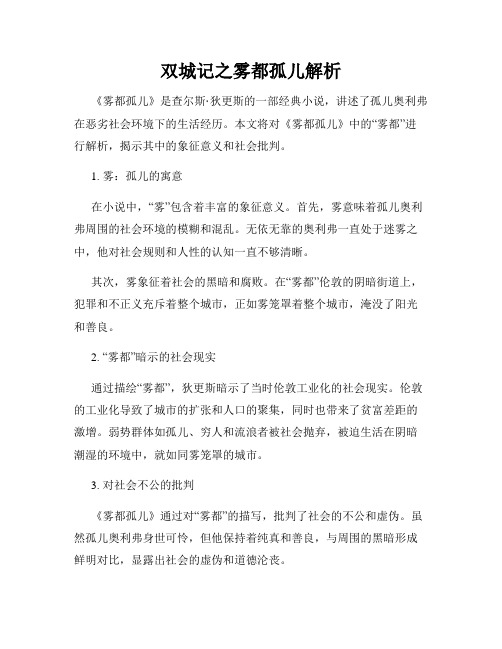
双城记之雾都孤儿解析《雾都孤儿》是查尔斯·狄更斯的一部经典小说,讲述了孤儿奥利弗在恶劣社会环境下的生活经历。
本文将对《雾都孤儿》中的“雾都”进行解析,揭示其中的象征意义和社会批判。
1. 雾:孤儿的寓意在小说中,“雾”包含着丰富的象征意义。
首先,雾意味着孤儿奥利弗周围的社会环境的模糊和混乱。
无依无靠的奥利弗一直处于迷雾之中,他对社会规则和人性的认知一直不够清晰。
其次,雾象征着社会的黑暗和腐败。
在“雾都”伦敦的阴暗街道上,犯罪和不正义充斥着整个城市,正如雾笼罩着整个城市,淹没了阳光和善良。
2. “雾都”暗示的社会现实通过描绘“雾都”,狄更斯暗示了当时伦敦工业化的社会现实。
伦敦的工业化导致了城市的扩张和人口的聚集,同时也带来了贫富差距的激增。
弱势群体如孤儿、穷人和流浪者被社会抛弃,被迫生活在阴暗潮湿的环境中,就如同雾笼罩的城市。
3. 对社会不公的批判《雾都孤儿》通过对“雾都”的描写,批判了社会的不公和虚伪。
虽然孤儿奥利弗身世可怜,但他保持着纯真和善良,与周围的黑暗形成鲜明对比,显露出社会的虚伪和道德沦丧。
小说中描绘了政府机构和贫民窟之间的鲜明对比,表明社会制度的不公和将贫穷者拋于一旁。
同时,通过那些寄人篱下的孤儿,狄更斯控诉了当时孤儿院的残酷和不人道。
4. 希望与救赎尽管《雾都孤儿》描绘了混乱的“雾都”,但小说中也存在着希望与救赎。
奥利弗作为主人公最终获得了幸福和平静的生活,显示了善良和正义最终战胜邪恶和黑暗的力量。
通过奥利弗的成长和经历,狄更斯呼唤了社会对悲剧命运下的人们施以援手,并在最终展示了对于社会问题的改善和希望的追求。
总结:《雾都孤儿》通过描述“雾都”和孤儿奥利弗的故事,传达了混乱的社会环境、社会不公和虚伪的道德观念等问题。
小说中批判了工业化时代伦敦社会的黑暗一面,同时呼吁对弱势群体给予关注和援助。
尽管整个故事充满了阴暗和挫折,但通过奥利弗的生命历程,狄更斯也展示了希望与救赎的力量。
《雾都孤儿》:人性、正义与社会的阴暗面

《雾都孤儿》:人性、正义与社会的阴暗面雾都孤儿(Oliver Twist)是英国作家查尔斯·狄更斯的一部经典小说,通过描述孤儿奥利弗的生活经历,深入探讨了人性、正义与社会的阴暗面。
本文将从三个方面来分析这部小说。
首先,雾都孤儿揭示了人性中的黑暗面。
故事中展现出各种形形色色的恶行和罪恶。
从最初奥利弗在贫困工house子里受尽虐待到后来被迫加入窃贼团伙,在他周围人物身上可以看到贪婪、残忍和冷漠等不良品质。
例如,寡母菲格夫人以及劳务院长布朗洛率领者组织进行非法活动;刺客比尔·西克斯代表着欺骗和背叛;而那些卖淫女也体现了道德败坏。
这些角色们无视他人之苦,并把自己个别利益凌驾于集体福祉之上, 丧失了对社会公平正义应有的责任感。
其次,《雾都孤儿》涉及到正义问题,尤其是对待弱势群体的正义。
小说中,奥利弗这个孤儿在社会底层生活艰辛,并且受到了各种不公平待遇。
他被剥夺了基本权利和尊严,同时也看到了其他人同样遭受着压迫和虐待。
狄更斯通过呈现奥利弗周围环境中的不公正、贫穷与骚乱等问题,揭示出当时英国社会存在的深层次问题。
小说以充满悬念而精彩的情节展示了奥利弗对抗那些欺凌者和不义之徒的斗争,并最终为自己赢得正义。
最后,《雾都孤儿》揭示了社会阴暗面及其带来的残酷性。
从工house子里恶劣条件下幼童们的悲惨命运开始,狄更斯形象地描述出19世纪伦敦底层社会腐败黑暗氛围:盲目信仰、人身买卖、拳击比赛等无法容忍与接受之行径泛滥成灾, 这使得道德价值观荡然无存并引发一系列社会问题。
通过这些描写,狄更斯警告人们要反思并改变社会现实中的不公平与堕落。
综上所述,《雾都孤儿》通过描述奥利弗的遭遇以及周围环境中的种种黑暗和罪恶,深入探讨了人性、正义与社会的阴暗面。
小说使读者对当时英国底层社会存在的问题有了更深刻的理解,并呼吁人们在面对不公正和邪恶时勇敢地站出来,追求真正的公平和正义。
它无愧于作为一部经典之作,并且至今仍然具有重要意义。
《雾都孤儿》:社会的冷漠,人性的光芒

《雾都孤儿》:社会的冷漠,人性的光芒《雾都孤儿》是一部揭示着19世纪伦敦社会丑陋与黑暗的经典小说。
小说中将主人公奥利弗·特威斯特(Oliver Twist)和其他角色们的命运紧密地串联起来,探讨了社会的冷漠和人性的光芒。
本文将分析小说中所展现的社会冷漠以及人性的光芒,并探讨这些现象在当今社会中的体现。
一、社会的冷漠《雾都孤儿》中展现了一个极其黑暗的伦敦,人们在贫困和疾病的折磨中艰难地生存。
小说中,社会冷漠的表现最为突出。
面对饥饿和疾病,人们无情地对待穷人和孤儿,导致他们沦为社会底层。
例如,在小说中,当奥利弗要求一份额外食物时,他却被惩罚得体无完肤,这说明社会的不公现象普遍存在。
事实上,社会冷漠在当今社会中同样有所体现。
虽然和小说中的情况不同,但现代社会中的人们往往对弱势群体漠不关心。
例如,在某些国家,生活在社会底层的人依然面临着贫困、饥饿和疾病,但他们却往往得不到足够的帮助和支持。
此外,对于一些被社会边缘化的人,例如流浪汉和无家可归者,大多数人常常选择视而不见,不愿去帮助他们。
二、人性的光芒虽然社会冷漠在小说中得到了充分的展现,但是小说也描绘了一些人性的光芒。
例如,主人公奥利弗就是一个十分善良和纯真的孩子。
即便在危险和险恶的环境中,他仍然坚持追寻内心的良知,从未放弃自己的信仰。
平时看待人也非常的无私和宽容,在面对自己那群虚伪和骗子的亲生亲戚时,他从未心存恶意,相反还是寻求和他们和解,这种充满爱心和同理心的品质,表达了人性深处最迷人的光芒。
奥利弗所展现的这种善良和纯真,也在当今社会同样得到了展现。
很多时候,当人们看到丑陋和黑暗的一面,往往容易感到绝望和失望。
但是,正是因为有像奥利弗这样充满正能量的人存在,才使人们重新看到人性最本真的一面。
例如,在一些慈善机构里,有很多人都在默默地为那些需要帮助的人提供各种帮助和支持。
结语总之,《雾都孤儿》是一部揭示社会的黑暗面和人性的光芒的经典小说。
小说中凸显了社会冷漠的现象,这一情况在当今社会中同样存在。
雾都孤儿揭示社会底层与上层的对立与冲突
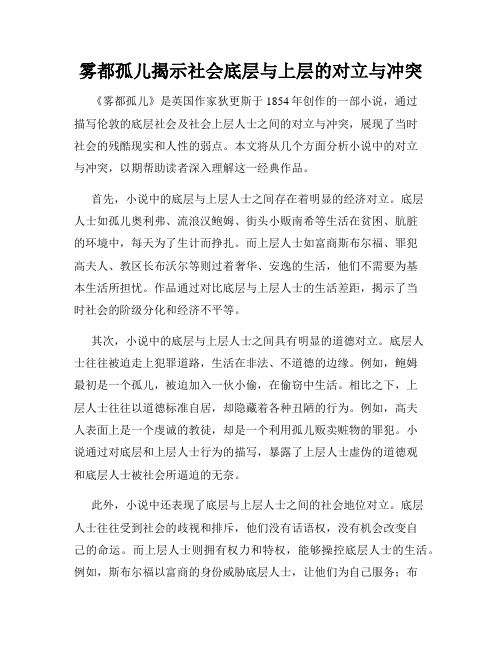
雾都孤儿揭示社会底层与上层的对立与冲突《雾都孤儿》是英国作家狄更斯于1854年创作的一部小说,通过描写伦敦的底层社会及社会上层人士之间的对立与冲突,展现了当时社会的残酷现实和人性的弱点。
本文将从几个方面分析小说中的对立与冲突,以期帮助读者深入理解这一经典作品。
首先,小说中的底层与上层人士之间存在着明显的经济对立。
底层人士如孤儿奥利弗、流浪汉鲍姆、街头小贩南希等生活在贫困、肮脏的环境中,每天为了生计而挣扎。
而上层人士如富商斯布尔福、罪犯高夫人、教区长布沃尔等则过着奢华、安逸的生活,他们不需要为基本生活所担忧。
作品通过对比底层与上层人士的生活差距,揭示了当时社会的阶级分化和经济不平等。
其次,小说中的底层与上层人士之间具有明显的道德对立。
底层人士往往被迫走上犯罪道路,生活在非法、不道德的边缘。
例如,鲍姆最初是一个孤儿,被迫加入一伙小偷,在偷窃中生活。
相比之下,上层人士往往以道德标准自居,却隐藏着各种丑陋的行为。
例如,高夫人表面上是一个虔诚的教徒,却是一个利用孤儿贩卖赃物的罪犯。
小说通过对底层和上层人士行为的描写,暴露了上层人士虚伪的道德观和底层人士被社会所逼迫的无奈。
此外,小说中还表现了底层与上层人士之间的社会地位对立。
底层人士往往受到社会的歧视和排斥,他们没有话语权,没有机会改变自己的命运。
而上层人士则拥有权力和特权,能够操控底层人士的生活。
例如,斯布尔福以富商的身份威胁底层人士,让他们为自己服务;布沃尔以教区长的身份操控舆论,掩盖自己的恶行。
小说通过对社会地位对立的描写,展现了当时社会的不公和底层人士的无助。
最后,小说中强调了底层和上层人士之间人性的冲突。
底层人士尽管在恶劣的环境中生活,仍保持着真善美的品质。
例如,奥利弗拒绝堕落,保持着对人性的信任和善良;鲍姆在被抓获后,宁愿背负冤屈也不愿背叛同伙。
相比之下,上层人士往往被金钱和权力腐蚀,他们丧失了对人性的信任和保持正直的能力。
小说通过对人性的冲突的描写,让读者反思身处社会底层或上层时,如何保持自己的道德底线。
《雾都孤儿》:社会的黑暗与孤独的心灵

《雾都孤儿》:社会的黑暗与孤独的心灵1. 引言1.1 概述《雾都孤儿》是查尔斯·狄更斯的经典小说,以19世纪伦敦为背景,深刻描绘了当时社会的黑暗与人们内心的孤独。
该小说通过主人公奥利弗·特威斯特的经历,展现了社会阶级之间的不平等、贫富差距的扩大,以及城市工业化与现代化带来的社会问题。
同时,小说还着重刻画了奥利弗和其他角色内心孤独、无助、被遗弃的心灵。
本文将对《雾都孤儿》中社会黑暗和孤独心灵这两个核心主题进行详细分析和探讨。
1.2 文章结构本文首先介绍《雾都孤儿》背景及其创作背景;然后分析伦敦当时的社会状况以及工业化与城市化对社会带来的影响;接着从角色分析入手,重点剖析主要人物奥利弗·特威斯特、芬努格尔先生和桑保罗夫人夫妇、博尔金斯先生和南希女士;随后探讨小说中展示孤独心灵的描写以及相关主题,包括家庭关系中的孤独、被抛弃和无助所引发的情感变化;最后,通过归纳总结,探讨小说对社会黑暗问题的警示作用,深入剖析孤独心灵主题在《雾都孤儿》中的深刻探讨,并提出读者应该从中获得的启示与思考。
1.3 目的本文旨在通过对《雾都孤儿》这部经典文学作品的分析与解读,揭示19世纪伦敦社会存在的黑暗问题以及人们内心深处无法逃离的孤独感。
通过深入探究作者塑造角色形象、运用场景、语言和符号等手法来展现主题,在此基础上分析小说对读者在当今社会中面临类似问题时可能产生的启示和思考。
目标是使读者更好地理解这部文学作品背后所蕴含的智慧与思想,并从中汲取力量与勇气去面对可能存在的社会困境及个人困境。
2. 雾都孤儿的背景:2.1 伦敦的社会状况:《雾都孤儿》这部小说发生在19世纪的伦敦。
伦敦当时正处于工业革命和城市化的浪潮之中,城市不断扩张,工厂逐渐兴起,大量来自乡村的人涌向城市,希望找到更好的工作机会和生活条件。
然而,这种迅速的发展也带来了一系列社会问题。
2.2 工业化与城市化对社会带来的影响:随着工业化和城市化的推进,伦敦变得越来越拥挤、污染且不卫生。
雾都孤儿的讽刺手法

雾都孤儿的讽刺手法
《雾都孤儿》是查尔斯·狄更斯笔下的经典作品,以其深刻的讽刺手法揭示了社会的黑暗面。
通过描述主人公奥利弗的苦难经历,狄更斯对当时的社会道德沦丧、虚伪和阶级矛盾进行了尖锐的批判。
首先,狄更斯巧妙地运用讽刺手法对当时的社会制度进行了批判。
在小说中,奥利弗作为孤儿被送进了一家所谓的“慈善”机构,然而那里的生活却与慈善相去甚远。
孩子们遭受虐待、饥饿和疾病,而这一切都是因为当时的社会制度对孤儿们的不负责任。
狄更斯通过讽刺这种制度的不公,呼吁读者关注社会问题,尤其是对弱势群体的关注。
其次,狄更斯对人性中的虚伪和伪善进行了讽刺。
小说中的一些角色,如班布尔和科尼,表面上道貌岸然,但实际上却是极度自私和虚伪的人。
他们以慈善为名,行剥削之实,暴露了当时社会上普遍存在的伪善现象。
狄更斯通过讽刺这些人的丑陋面目,提醒读者在面对人性的弱点时要保持警惕。
此外,狄更斯还运用讽刺手法揭示了阶级矛盾和贫富差距。
小说中的主人公奥利弗作为一个贫穷的孤儿,生活在社会的最底层。
他经历了无数的苦难和剥削,而这一切都是因为社会阶级的不平等。
与此同时,那些富人却过着奢侈的生活,对社会问题视而不见。
狄更斯通过讽刺这种阶级矛盾,呼吁读者反思社会的不公和贫富差距。
综上所述,《雾都孤儿》的讽刺手法在多个层面对社会问题进行了深刻的揭示和批判。
通过奥利弗的苦难经历,狄更斯呼吁读者关注社会问题、警惕人性的弱点并反思社会的不公和贫富差距。
这种讽刺手法不仅使小说具有很高的艺术价值,而且也使其成为一部具有深刻社会意义的经典之作。
大学语文《雾都孤儿》赏析

浅谈雾都孤儿“没有强烈的爱,没有仁爱之心,没有慈悲的人,是永远得不到幸福的。
”一百多年前,25岁的狄更斯在《雾都孤儿》里写下这句话,由此引出了孤儿奥利弗·特威斯特感人至深的故事。
小说里,这个可怜的孩子在凶猛的人世间历尽苦难,见识过最恶毒的人心,经历过无数次垂死的瞬间。
但无论遭遇什么,奥利弗永远那么乖巧善良,高尚的灵魂从未被罪恶侵蚀半分。
最终,他对世界的爱与善,帮他战胜了命运,赢得了专属于他的幸福。
当你看完《雾都孤儿》,就会明白:善良永远不会错,善良的人永远不会吃亏。
古语言:善人者,人亦善之。
心若向善,福气自来;人若向善,必结善缘。
善良,是一种选择。
奥利弗降生在济贫院,生来就被打上了贫穷卑微的烙印。
直到10岁前,他没吃过一顿饱饭,没穿过一件新衣,生活里充斥着辱骂和殴打。
这些孤儿长到十来岁,就要被驱赶出去,自谋生路。
奥利弗先是被送给殡仪员当学徒,后因实在受不了殡仪员的殴打连夜逃走。
在奥利弗十年的人生里,他从未得到过外界的一点爱,但这并没有泯灭他骨子里的善良与坚强。
他从未记恨过谁,也从未伺机报复。
但厄运紧抓着奥利弗不放,在逃亡伦敦的路上,他被一个骗子拐进了贼窝。
贼老大是一个名叫费金的犹太老头,他一见奥利弗就热情地给他吃的、穿的,还给他钱。
除此之外,费金还亲自教奥利弗“本事”,教他如何去偷、去抢、去骗。
但无论费金怎么威逼利诱,奥利弗从不就范。
这天,奥利弗亲眼看见同伴们在一个书摊上偷了一位老先生的手帕。
他的内心忽然被刺痛,一下子惊慌失措拔腿就跑。
结果他被当成了小偷,遭到众人的围攻,并被带去了警察局。
后来,幸亏书摊老板及时赶到,帮奥利弗摆脱了罪名。
看着满身是血的奥利弗,被偷的老先生心生怜悯,决定把他接回家救治。
就这样,奥利弗暂别了苦难,迎来了有生以来最幸福的时光。
狄更斯在书中写道:“正直的人混得不好,往往并不是因为他们真正做错了什么。
”有时候,我们对这个世界充满善意,换来的只有背叛和伤害。
每当这个时候,你总会怀疑,是不是自己的善良助长了罪恶?但奥利弗的故事告诉我们,善良并没有错。
雾都孤儿中的正义与邪恶
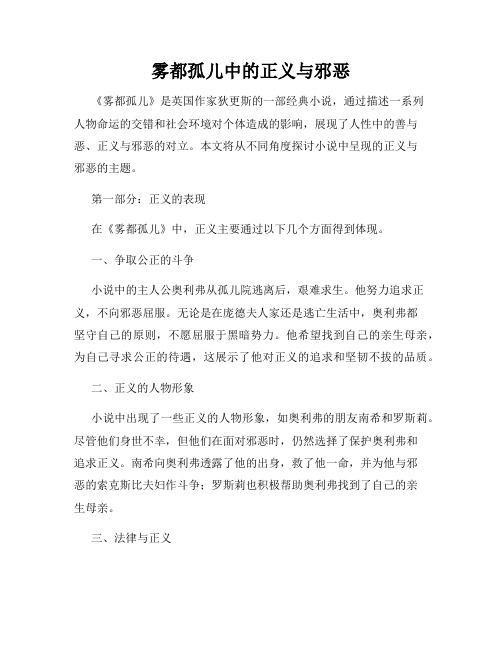
雾都孤儿中的正义与邪恶《雾都孤儿》是英国作家狄更斯的一部经典小说,通过描述一系列人物命运的交错和社会环境对个体造成的影响,展现了人性中的善与恶、正义与邪恶的对立。
本文将从不同角度探讨小说中呈现的正义与邪恶的主题。
第一部分:正义的表现在《雾都孤儿》中,正义主要通过以下几个方面得到体现。
一、争取公正的斗争小说中的主人公奥利弗从孤儿院逃离后,艰难求生。
他努力追求正义,不向邪恶屈服。
无论是在庞德夫人家还是逃亡生活中,奥利弗都坚守自己的原则,不愿屈服于黑暗势力。
他希望找到自己的亲生母亲,为自己寻求公正的待遇,这展示了他对正义的追求和坚韧不拔的品质。
二、正义的人物形象小说中出现了一些正义的人物形象,如奥利弗的朋友南希和罗斯莉。
尽管他们身世不幸,但他们在面对邪恶时,仍然选择了保护奥利弗和追求正义。
南希向奥利弗透露了他的出身,救了他一命,并为他与邪恶的索克斯比夫妇作斗争;罗斯莉也积极帮助奥利弗找到了自己的亲生母亲。
三、法律与正义在小说中,法律也被视为正义的象征。
警察、法官和有良知的公民都希望通过法律来维护正义。
小说中,冒充奥利弗亲戚的莎利舅舅斯利将靠谱夫妇绑架,最终被法律绳之于法。
这展示了法律在维护正义方面的重要作用。
第二部分:邪恶的展现在《雾都孤儿》中,邪恶不仅在社会环境中存在,还表现在一些人物的行为和性格中。
一、社会恶劣环境小说中描绘了维多利亚时代的贫穷和不公。
孤儿院的恶劣管理、工作场所的压迫和黑暗势力的存在,都暗示了社会上的邪恶存在。
人们在这样的环境下生存,往往会受到邪恶势力的侵害。
二、邪恶人物形象《雾都孤儿》中塑造了一些令人讨厌的邪恶人物。
比如索克斯比夫妇,他们利用孤儿来从事非法活动,以及贪污腐化的官员布兰洛、黑心商人茂德金等。
这些人物贪婪、自私,无视他人的痛苦,是邪恶的象征。
三、正义与邪恶的对立小说中,正义与邪恶的对立是明显的。
正义的人物代表了光明与温暖,通过他们的努力,能够抵御邪恶的侵蚀。
与此相反,邪恶的力量代表黑暗与无情,试图毁灭正义的力量。
《雾都孤儿》:无助与慈爱的碰撞

雾都孤儿:无助与慈爱的碰撞1. 引言《雾都孤儿》是查尔斯·狄更斯于19世纪发表的一部畅销小说。
这部小说以维多利亚时代伦敦为背景,通过讲述一个被遗弃在天桥上的男孩奥利弗,展现了社会不公与人性善恶的冲突。
本文将深入探讨主题:“雾都孤儿”中无助与慈爱之间的碰撞。
2. 无助的奥利弗主角奥利弗作为一个雾都孤儿,从小便面临重重困境。
他生活在贫穷和不公正之中,没有亲人可以依靠,并被迫进入恶劣环境下的工house工作。
他身陷社会底层,所经历的种种困境使其深感无助。
然而,正是由于这种无助,奥利弗才成为叙事者深度揭示伦敦社会黑暗一面的视角。
3. 社会不公与冷漠《雾都孤儿》通过描写伦敦社会的冷漠和不公,进一步突出了奥利弗的无助。
小说中描绘了贫富差距悬殊的伦敦社会,上层精英对下层人民的冷漠与忽视愈发明显。
这种不公正的分配方式使得像奥利弗这样的孤儿感到无助,并陷入更加惨淡的生活。
4. 慈爱与关怀尽管《雾都孤儿》中存在着严酷的环境和冷漠的社会,但也有许多人物体现了慈爱与关怀。
从家政女佣罗丝到亚利克斯太太再到布朗洛先生,这些角色给予了奥利弗希望和温暖。
他们是少数尚存善良之人,通过为奥利弗提供庇护和关心,点燃了他内心对美好生活追求的火花。
5. 碰撞与超越在小说中,无助与慈爱形成鲜明对比并最终碰撞。
奥利弗在面对挑战时获得力量,并展现出坚定而善良的本性。
他通过遇到的困境和接受的慈爱,不断成长并超越了自己原本被定义的无助形象。
6. 结论《雾都孤儿》通过展示奥利弗在无助与慈爱之间的碰撞,揭示了社会中存在的不公和冷漠以及人性中的善良和关怀。
这部小说提醒我们反思社会问题,并让我们意识到即使身处困境,通过遇到慈爱和给予他人关怀,人们可以超越自己并改变命运。
它成为了一部经典文学作品,触动了读者内心最深处的情感。
注:此文章为AI根据输入内容生成,仅供参考和借鉴。
- 1、下载文档前请自行甄别文档内容的完整性,平台不提供额外的编辑、内容补充、找答案等附加服务。
- 2、"仅部分预览"的文档,不可在线预览部分如存在完整性等问题,可反馈申请退款(可完整预览的文档不适用该条件!)。
- 3、如文档侵犯您的权益,请联系客服反馈,我们会尽快为您处理(人工客服工作时间:9:00-18:30)。
Inner Conflict of Nancy in Oliver TwistIntroductionCharles Dickens is a famous novelist in nineteenth century, and he is of great influence and importance in English literature. Oliver Twist is one of the most famous representative novels written by him, which characterized by critical realism. It reveals the darkness of the capitalistic society.Nancy, a figure in Oliver Twist, is filled with conflicts and complexities. She has a rich inner world. Nancy was forced to steal since twelve years ago, and later become the mistress of Bill Sikes, the second head of the gang. It was Nancy who brings little Oliver back to the gang with tricks. But out of the goodness and sympathy in her deep heart, she tried her best to protect Oliver from beating of Fagin. And it was also Nancy who helped Oliver get rid of the gang and find his family. Disappointingly, giving up the chance to begin a new life, Nancy chose to come back to the dirty place out of love for Sikes and loyalty to the gang. The essay analyzes the inner conflicts of Nancy when she came across one after another event.I.Inner conflicts of NancyPeople who read Oliver Twists would always be impressed by Nancy in her struggle between her humble birth and noble sprints and between the inner goodness and outer darkness. The contradictoriness of Nancy makes her much close to life and true to life.A.Conflicts between good and evilNo doubt Nancy has an evil aspect, as she lives with gang for twelve years. She must have committed a number of crimes and have gotten used to theft life. Nevertheless, the good aspect of Nancy showed when she saves Oliver, commands attention.Nancy is one of the conspirators who kidnap Oliver and keep him in gang. Her evil aspect is obviously showed in her professional conspiracy. Under the threat and coaxing of Fagin and Sikes, Nancy accepted the mission of bringing Oliver back. She dressed as a gentlewoman who was worriedly looking for little brother, and easily get the information about Oliver from a police. Again, when Oliver was walking on the street, Nancy seized him and took Oliver back to gang as the identity of his sister in front of the crowd. Her performance is natural, and makes no one suspicious. To some extent, Nancy is exactly the one that sends Oliver to hell. From then on, Oliver’s miserable life begins.“They were not exactly pretty, perhaps; but they had a great deal of color in their faces, andlooked quite stout and hearty. Being remarkably free and agreeable in their manners, Oliver thought them ve ry nice girls indeed.” (Dickens 94) It is the first impression of Nancy in Oliver’s mind, which determines her positive influence in the story.Nancy sees the shadow of herself in Oliver. In order to prevent Oliver from a tragic life like her, she does her best, even at the cost of her life. When Fagin inflicted blows on Oliver with the club, Nancy stopped Fagin without considering herself. When Bill Sikes sent out dogs to catch Oliver, Nancy again came out boldly. She said: “the child shan’t be torn down b y the dog, unless you kill me first.” (Dickens 165) Besides, Nancy took great risks in tapping the conversation of Fagin with Monks, and in delivering information to Rose. She died for the happiness of Oliver, the poor little boy.Though the most part of Nancy’s life is evil and sinful, her action to save Oliver is respectful. Her death also symbolizes the fall of gang. She has atoned for her crimes through her life and bloods. Nancy has a pure soul.B.Conflicts between humble birth and noble virtuesNancy has no choice about her birth. Since a very young age, she begins a theft life with Fagin, and lives in dirty and messy environments. As she grows up, Nancy becomes a prostitute and mistress of Sikes. The tragic life is forced on her, which makes self-esteem and self-abased coexists in her heart. And the conflict continues to influent her in decision time.Dickens does n’t tell the story of Nancy particularly, but it still leaks out. When she protected Oliver from good beating of Fagin, Nancy cried, pointing to Oliver: “I thieved for you when I was a child not half as old as this!” She shouted at Fagin with anger: “I have been in the same trade, and in the same service, for twelve years since.” Nancy poured out the words in one continuous and vehement scream: “It is my living; and the cold, wet, dirty streets are my home; and you’re the wretch that drove me to them long ago, and that’ll keep me there, day and night, day and night, till I die!”(Dickens 169)Nancy has a more miserable life than Oliver. It can be indicated that she must have been beat and abused by Fagin since a young age. Forcibly occupying by Sikes increases her sense of resignation.However, different from other members in the gang, Nancy is not manipulated by sheer evil. From the remarks, it is clear that Nancy hates the dirty surroundings and wrenched way of life. Nancy has no alternative about her life, but she makes effort to change the life of Oliver. Even though she has a humble birth as thieve, outcast and ruffian, Nancy still has a feeling of pride and self-assured.When she meets Rose, who has a noble birth, Nancy tossed her head with affected carelessness as she said: “It’s a hard matter to get to see you, lady. If I had taken offence, and gone away, asmany would have done, you’d have been sorry for it one day and not without reason either.” (Dickens 425) Nancy feels self-abased in front of such a beautiful lady, and she says the words just to maintain her self-esteem. In order to see Rose, Nancy suffers humiliation from waiters and housemaids. With all she has done, Olive gets saved.The love of parents and positive environment is significant to the form of one’s wholesome personal ity and psychology. Nancy doesn’t have the luck. She is made to associate with evil person and break the law, but the noble virtues of Nancy as goodness, brave, proud and upright make people feel sympathy and pity for her. Dickens expresses his criticism to the dark society through the tragic life of Nancy, which also arouse readers’ resonance.C.Conflicts about loveThe names of Nancy and Sikes brim with implications endowed by Dickens. The abbreviations for their names are “N”and “S”, signifying the two poles of magnetic needle. It indicates that Nancy and Sikes is a contradictory and unified entity. They are interdependent and inseparable. Constitutionally, Nancy is the emblem of mercy, but Sikes is the emblem of tyranny. Nancy prefers to be killed by Sikes than abandon him. Sikes also cannot live without Nancy. He almost lost his mind after killing Nancy, and finally fell from the roof and strangled by the string he tied for escape.As one may know from the novel, Sikes regards Nancy only as a servant and slave. Every time he has a bad mood, he will beat and scold Nancy to vent anger. Even when he fell ill, he would keep cursing on Nancy without a little thank. “Come! Don’t stand sniveling there. If you can’t do anything better than that, cut off altogether. D’ye hear me?” (Dickens 405) is what he said to Nancy who looked after him carefully during the illness.Regardless how bad Sikes treats Nancy, Nancy still loves him as a long-term habit. She knows Sikes is evil and violent, but she cannot abandon and betray him. When Rose offered her a better life, she still wanted to go back because of Sikes. “I must go back, because—how can I tell such things to an innocent lady like you?—because among the men I have told you of, there is one—the most desperate among them all—that I can’t leave; no, not even to be saved from the life I am leading now.”(Dickens 428) is what Nancy replied Rose.Nancy is persistent, firm but blind about love. Sikes cannot feel and understand the love of her. Her love finally ruins her opportunity of new life and future happiness.II.Influence of inner conflicts on Nancy’s fate Nancy’s life can be commented as a tragedy. She is never able to get rid of Fagin and the gang.Her death is also pathetic and pitiful——killed by Sikes, the man she loves. To a certain degree, Nancy’s inner conflicts are closely linked to her tragic fate.A.Inability to get rid of the gangNancy has a wish to have a decent job and reputation in society in her deep heart. Having committed so many crimes, she gets her conscience smitten. She is shamed of his humble birth as a thief, the people at the bottom of society. She holds a negative attitude towards her own life. Self-abased is deeply rooted in her mind. The inner conflicts of Nancy is clearly showed in the following sentence, when Rose and the gentleman advice her to leave the gang. “I am chained to my old life. I loathe and hate it now, but I cannot leave it. I must have gone too far to turn back—and yet I don’t know, for if you had spoken to me so, some time ago, I should ha ve laughed it off.”(Dickens 479)Nancy keeps absolute loyalty to the gang in spite that she hates Fagin so much. She goes against the gang to help Oliver and rejects to betray them is a strong contrast. When Nancy was asked to deliver up Fagin, her answer was decisive. “I will not do it! I will never do it!” replied the girl. “Devil that h e is, and worse than devil as he has been to me, I will never do that.”(Dickens 493) She regards herself as an inseparable part of the gang, and has affections with them.The love for Sikes is another bond for Nancy. She cares for the safety of Sikes at any time. For him, Nancy resigned the hope and rescue to a different life. “I cannot leave him now! I could not be his death!” is Nancy is claim.Nancy and Oliver were all from a humble birth and lived a miserable life, but they had totally different life. The three points mentioned above can account for Nancy’s inability to get rid of the gang.B.Inevitable deathNancy’s death is indicated several times in the novel. Nancy anticipated that she will die in the midst of cold and hunger, and riot and drunkenness like her birth. In addition, on the day of meeting with Rose before her death, she always had horrible thoughts about death, and shrouds with blood.The images are both symbols of her death.Nancy’s contradictory vision of love is the main reason that leads to her destruction. She regards love as more important than reputation, future, and even love. Nancy once said: “Whether it is God’s wrath for the wrong I have done, I do not know; but I am drawn back to him through every suffering and ill-usage; and I should be, I believe, if I know that I was to die by his hand at last.”(Dickens 429) Nancy never obtained love in her whole life, but she dedicated her true love to Sikes. She would rather be killed by Sikes than abandon him.Nancy knows that Sikes is the boldest and cruelest among the gang. Her blind love for Sikesmakes her believe that there is still love in Sikes’ heart. When Sikes was going to kill her, she begged: “Bill, for dear God’s sake, for your own, for mine, stop before you spill myblood!”(Dickens 507) There was always hope in Nancy’s mind that Sikes would become good. Nancy’s love for Sikes can be found everywhere in the book. And her stubborn love finally ruined her future and cost her life.ConclusionIn Oliver Twist, the character of good people and bad people are evidently divided in the novel. But the figure of Nancy embodies both the bright and dark side of people, and leaves a deeply impression for people. Nancy’s inner conflicts cause her death. She represents hundreds of thousands of miserable and wrenched people persecuted by society at that time. The character of Nancy also implies that there is not always a clear boundary between good and evil.BibliographyCharles Dickens. Oliver Twist. Electronic edition from Qc EnglishSong Jing: “On the character Nancy in Oliver Twist”, journal of Jinzhong teachers college, Mar 2000, Vol.17 No.1.Zhang Dingshuan: A new concise history of English literature, Shanghai foreign language education press, 2002张蔚:《雾都孤儿》中南希的双重性格分析,载《语言文学研究》,2010年11月中旬刊,第10-11页。
